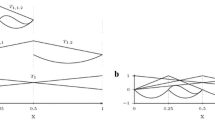Abstract
We present an hp-adaptive strategy that is based on estimating the decay of the expansion coefficients when a function is expanded in L 2-orthogonal polynomials on a triangle or a tetrahedron. We justify this approach by showing that the decay of the coefficients is exponential if and only if the function is analytic. Numerical examples illustrate the performance of this approach, and we compare it with two other hp-adaptive strategies.
Similar content being viewed by others
References
Ainsworth M, Senior B (1997) Aspects of an adaptive hp-finite element method: adaptive strategy, conforming approximation and efficient solvers. Comput Methods Appl Mech Eng 150:65–87
Ainsworth M, Senior B (1998) An adaptive refinement strategy for hp-finite-element computations. Appl Numer Math 26:165–178
Ainsworth M, Senior B (1999) hp-finite element procedures on non-uniform geometric meshes. In: Bern M, Flaherty J, Luskin M (eds) Grid generation and adaptive algorithms, IMA vol. math. appl. vol 113. Springer, Berlin Heidelberg New York, pp 1–27
Apel T (1999) Anisotropic finite elements: local estimates and applications. In: Advances in numerical mathematics. Teubner, Stuttgart
Apel T, Grosmann S, Jimack P, Meyer A (2004) A new methodology for anisotropic mesh refinement based upon error gradients. Appl Numer Math 50:329–341
Babuška I, Guo BQ (1986) The hp-version of the finite element method. Part 1: the basic approximation results. Comput Mech 1:21–41
Babuška I, Suri M (1987) The optimal convergence rate of the p-version of the finite element method. SIAM J Numer Anal 24:750–776
Bernardi C, Owens RG, Valenciano J (2001) An error indicator for mortar element solutions to the Stokes problem. IMA J Numer Anal 21:857–886
Bertóti E, Szabó B (1998) Adaptive selection of polynomial degrees on a finite element mesh. Int J Numer Methods Eng 42:561–578
Creusé E, Kunert G, Nicaise S (2004) A posteriori error estimation for the Stokes problem: anisotropic and isotropic discretizations. Math Methods Appl Sci 14:1297–1341
Demkowicz L, Solin P (2004) Goal oriented hp-adaptivity for elliptic problems. Comput Meth Appl Mech Eng 193:449–468
Demkowicz L, Rachowicz W, Devloo Ph (2002) A fully automatic hp-adaptivity. J Sci Comput 17:117–142
DeVore RA, Lorentz GG (1993) Constructive approximation. Springer, Berlin Heidelberg New York
Eibner T (2006) Randkonzentrierte und adaptive hp-FEM. PhD Thesis, Technische Universität Chemnitz
Eibner T, Melenk JM (2006) Fast algorithms for setting up the stiffness matrix in hp-FEM: a comparison. In: Lipitakis E (ed) Computer mathematics and its applications-advances and developments (1994–2005). LEA publisher, Athens, pp 575–596
Formaggia L, Micheletti S, Perotto S (2004) Anisotropic mesh adaption in computational fluid dynamics: application to the advection-diffusion-reaction and the Stokes problems. Appl Numer Math 51:511–533
Goering H, Roos HG, Tobiska L (1993) Finite-element-methode. Akademie, London
Heuer N, Mellado ME, Stephan EP (2001) hp-Adaptive two-level methods for boundary integral equations on curves. Computing 67(4):305–334
Heuveline V, Rannacher R (2003) Duality-based adaptivity in the hp-finite element method. J Numer Math 11(2): 95–113
Hörmander L (1990) An introduction to complex analysis in several variables. North Holland, Amsterdam
Houston P, Süli E (2005) A note on the design of hp-adaptive finite element methods for elliptic partial differential equations. Comput Meth Appl Mech Eng 194:229–243
Houston P, Senior B, Süli E (2003) Sobolev regularity estimation for hp-adaptive finite element methods. In: Brezzi F, Buffa A, Corsaro S, Murli A (eds) Numerical mathematics and advanced applications, ENUMATH 2001. pages 631–656. Springer, Berlin Heidelberg New York, pp 631–656
Karniadakis GE, Sherwin SJ (1999) Spectral/hp element methods for CFD. Oxford University Press, New York
Mavriplis C (1994) Adaptive mesh strategies for the spectral element method. Comput Methods Appl Mech Eng 116(1–4):77–86
Melenk JM (2002) hp finite element methods for singular perturbations. In: Lecture Notes in Mathematics, vol 1796 Springer, Berlin Heidelberg New york
Melenk JM, Wohlmuth B (2001) On residual-based a posteriori error estimation in hp-FEM. Adv Comp Math 15:311–331
Melenk JM, Gerdes K, Schwab C (2001) Fully discrete hp-FEM: fast quadrature. Comput Meth Appl Mech Eng 190:4339–4364
Oden TJ, Patra A, Feng YS (1993) An hp adaptive strategy. In: Noor AK (ed) Adaptive, multilevel and hierarchical computational Strategies. ASME, New York, pp 23–46
Oden JT, Wu W, Ainsworth M (1995) Three-step hp adaptive strategy for the incompressible Navier–Stokes equations. In: Babuška I, Flaherty J, Henshaw W, Hopcroft J, Oliger J, Tezduyar T (eds) Modeling, mesh generation, and adaptive numerical methods for partial differential equations. Springer, Berlin Heidelberg New York, pp 347–366
Schwab C (1998) p- and hp-finite element methods. Oxford University Press, New York
Author information
Authors and Affiliations
Corresponding author
Rights and permissions
About this article
Cite this article
Eibner, T., Melenk, J.M. An adaptive strategy for hp-FEM based on testing for analyticity. Comput Mech 39, 575–595 (2007). https://doi.org/10.1007/s00466-006-0107-0
Received:
Accepted:
Published:
Issue Date:
DOI: https://doi.org/10.1007/s00466-006-0107-0




